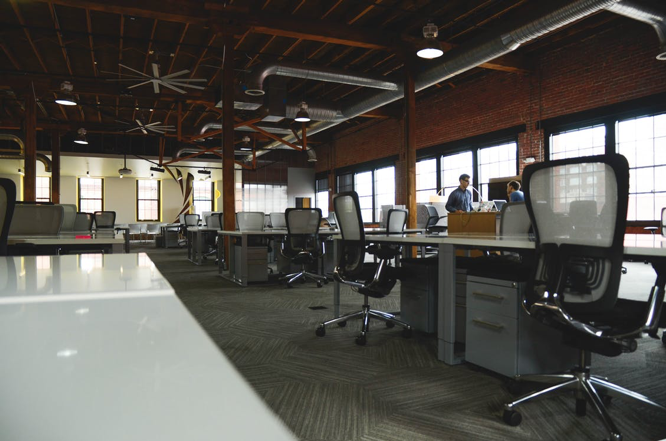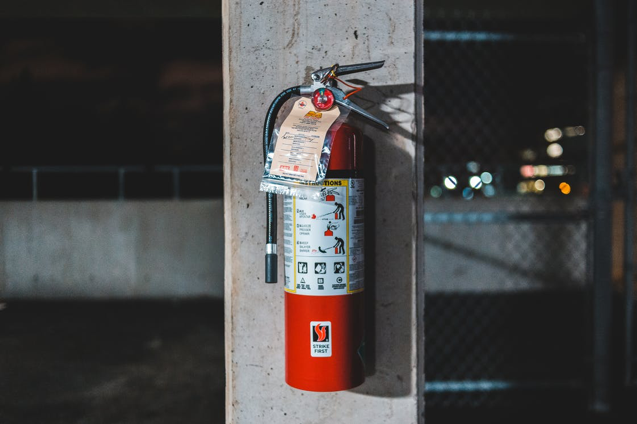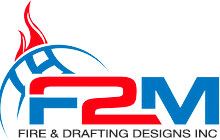Types of Fire Protection for Commercial Buildings
There are many types of different fire protection systems for commercial buildings. For starters, fire protection systems for commercial buildings differ from that of residential buildings. The primary reason for installing a fire protection system in a commercial building is to secure human lives and reduce the potential risks of damage to property in case of fire emergencies.
When commercial buildings have a reliable fire protection system, the owner and occupants/ workers feel confident and safe. This implies a responsible and secure workplace for conducting business and other commercial activities.

(Source)
But what are the “various” fire protection options for commercial buildings? Below, we will discuss some active and passive types of fire protection systems.
Different Types of Active-Fire Protection for Commercial Buildings
Fire Sprinkler Systems
Fire Sprinkler Systems consist of numerous sprinkler heads connecting to a series of pipes. The pipes in fire sprinkler systems have either electronic (automatic) or manual valve control. A pressurized water discharge through the sprinkler head(s) occurs after the activation of the fire alarm.
Every sprinkler head can discharge the water from the pipe simultaneously. A single sprinkler head may also act independently, regardless of all the sprinkler heads releasing water at once. Three different types of fire sprinkler pipe systems:
- Wet pipe; this fire sprinkler system is capable of holding water in the pipes at all times. This type of fire sprinkler system is highly suitable for warm places that are not under the influence of icy weather.
- Dry pipe; unlike a wet pipe system, this fire sprinkler system contains compression in the pipes at all times in the form of pressurized air or nitrogen. This is because, in cold and icy places, water freezes in the pipes, which causes a delay in extinguishing fires. Hence, normally when the fire alarm rings upon detecting a fire, pipes release the air, and the sprinkler heads discharge water.
- Deluge System; this fire sprinkler system is extensively adequate for places that comprise highly combustible and flammable materials. The spontaneous fire damage and the risk of losing human lives (workers or staff at the highly fire-hazardous places) are relatively low due to this fire sprinkler system. All of the sprinkler heads discharge water at once when the fire alarm rings. Hence, an instant fire safety measure.
These systems of fire protection are highly popular and are common in a large number of commercial buildings. However, there may be instances when water sprinkler systems might cause more damage than security. In some cases, they may cause significant water damage. Of course, with proper training and installation of manual alarms and switches, irreversible water damage is avoidable.
Foam Water Sprinkler System
Sometimes, a fire sprinkler system may contain water mixed with a concentrate of foam. This instantly douses fumes and smokes resulting from the combustion of materials such as flammable gases or alcohol. These materials combust after exposure to a few minor sparks. Nevertheless, foam water suppresses flammable solvents, reducing the chances of a re-flash.
Fire Extinguishers and Blankets
Extinguishers and fire blankets are an essential part of an active fire protection system in a commercial building. Moreover, certain offices and workplaces demand proper training and practice of their employees and staff against fire hazards.

(Source)
The use of a fire extinguisher at the origin of the fire restricts the spread. Fire blankets cover the area of the fire, which restricts air and keeps it from blazing.
Passive Fire Protection Systems for Commercial Buildings
Fire Resistant Walls, Glass, Doors, Windows
Fire-resistant doors are aluminum coated. They have standard smoke-stopping hardware and can withstand heat for up to 60 minutes. Similarly, a few glass-windows or glass-doors are fire-resistant. They are able to withstand heat and fire emergency features for up to two hours.
Conclusion: Consult With A Professional Fire Protection Company
The task of creating, designing, and installing fire protection systems falls on the engineers and architects respectively in the industries. Moreover, their expertise and knowledge can also help you make excellent decisions for the fire safety of your commercial building.
At F2M Fire & Drafting Designs Inc., our team of trained professionals have extensive knowledge about fire protection systems. Our engineers and technicians will help you design a custom fire sprinkler system for your commercial building right here in New York City, the Tri State area, or in another state in the US.
For a free consultation, call us at (718) 928-3009 or email us at info@f2mfadds.com.
References
- https://united-fire.com/a-guide-to-the-different-types-of-commercial-fire-protection-systems-available-today/
- https://www.slideshare.net/snehacoutinho/fire-fighting-in-commercial-buildings-services
- https://www.netatmo.com/en-us/guides/security/fire/faq/fire-protection
- https://en.wikipedia.org/wiki/Active_fire_protection

[…] misconception leads building owners to choose the wrong types of fire sprinklers and suppression systems. Often, this leads to major losses and damage. Let’s go over the […]